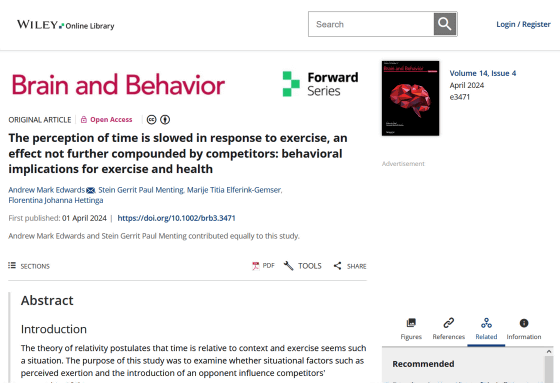Research shows that time seems to pass more slowly while exercising

When you're running at a club or gym, you may have had the despairing experience of thinking, 'I've been running so much, but only five minutes have passed.' A new study has revealed that time actually feels slower when you're exercising.
The perception of time is slowed in response to exercise, an effect not further compounded by competitors: behavioral implications for exercise and health - Edwards - 2024 - Brain and Behavior - Wiley Online Library

Scientists Confirm Exercise Slows Down the Perception of Time: ScienceAlert
https://www.sciencealert.com/scientists-confirm-exercise-slows-down-the-perception-of-time
In a paper published in the peer-reviewed scientific journal Brain and Behavior on April 1, 2024, a Dutch and British research team conducted an experiment on 33 subjects, 16 women and 17 men, in which they were tasked with 'counting 30 seconds without relying on a clock' while pedaling an exercise bike under three conditions.
The subjects timed themselves using only their internal senses before, during and after riding the stationary bike. They also timed themselves using only their internal senses while pedaling the stationary bike under three different conditions: attempting a 4km time attack solo, running 4km as fast as possible despite seeing an avatar on the screen, and running 4km faster than the avatar on the screen.

The results showed that when subjects were at rest, the perceived 30 seconds generally felt slightly longer than the actual 30 seconds, meaning that they felt like time was passing faster than it actually was.
On the other hand, it was found that while the subjects were pedaling the exercise bike, the perceived 30 seconds felt about 8% shorter than the actual time on average. The graph below shows the difference between the perceived time and the actual time as a percentage. It can be seen that the perceived 30 seconds felt longer than the actual time in both 'Pre-Exercise' and 'Post-Exercise', but felt shorter than the actual time during 'During Exercise'. The presence or absence of an opponent and the intensity of exercise did not have a significant effect on the perception of time.

The research team acknowledged that the study was relatively small-scale, but argued that it suggested that exercise itself, rather than exercise intensity, was the cause of distorting time perception. 'While this study provides novel and impactful insights, further research is needed to better understand the roles of external stimuli, exercise intensity, and exercise duration in time perception during exercise,' they said.
Related Posts:
in Science, Posted by log1h_ik







